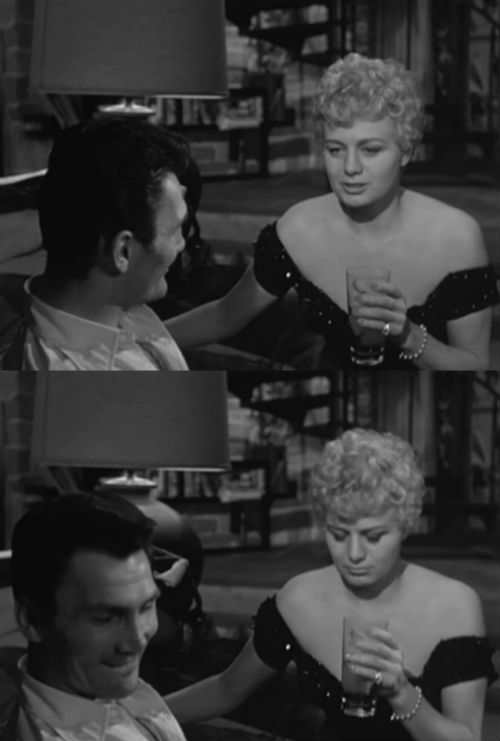← Back to Reviews
in
The Big Knife
A razor sharp screenplay and some charismatic performances are the primary selling points of 1955's The Big Knife, a slick and sizzling look at Hollywood behind the scenes that takes no prisoners.

Based on a play by Clifford Odets, the film version stars Jack Palance as Charlie Castle, a movie star with a shady past at a crossroads in his career and his personal life...he wants out when his current contract with the studio expires and so does his wife, Marian (Ida Lupino) who is separated from Charlie but still in love with him. Of course, studio head Stanley Hoff (Rod Steiger) is not having this and is willing to put Charlie at the center of an ugly scandal involving a boozy starlet (Shelley Winters) in order to have his way.

Charlie's life is further complicated by Connie (Jean Hagen), the wife of his best friend who seems to be willing to throw her marriage away for Charlie and by Smiley (Wendell Corey), Hoff's flying monkey whose agenda seems to change from scene to scene.

Odets' play premiered on Broadway in 1949 with John Garfield playing Charlie and ran for 109 performances. James Poe does a terrific job of opening up the story for the screen and being true to the original story, a biting and merciless look at what some Hollywood movers and shakers will do to protect their bottom line. This combined with a story of a crumbling marriage crying to be repaired but the manifestations of this ugly story keep Charlie and Marian torn apart, even though it's the last thing they or we want.

This film was done on a modest budget, evidenced by the black and white photography, though I think black and white just added an additional layer of intensity to this troubling story. Kudos to Edward G. Boyle's set direction though...Charlie's house is gorgeous. Frank DeVol's music is a little much. but it didn't interfere too much. The performances were superb down the line...Palance's performance as Charlie was riveting and Lupino underplays the melodramatic aspects of her character to maximum effect. Rod Steiger was nothing short of bone-chilling as the studio head, which he played like a mob boss. Some might find this performance over the top but I found it fascinating and wonderfully entertaining. Jean Hagen, fresh off being robbed of an Oscar for Singin in the Rain, once again proves what an underrated actress she was and Shelley Winters shined in her brief role as the pathetic Dixie, reminiscent of the tragic Alice Tripp in A Place in the Sun. Once again, I must thank my good friend Citizen for recommending this one...I loved this movie.
A razor sharp screenplay and some charismatic performances are the primary selling points of 1955's The Big Knife, a slick and sizzling look at Hollywood behind the scenes that takes no prisoners.

Based on a play by Clifford Odets, the film version stars Jack Palance as Charlie Castle, a movie star with a shady past at a crossroads in his career and his personal life...he wants out when his current contract with the studio expires and so does his wife, Marian (Ida Lupino) who is separated from Charlie but still in love with him. Of course, studio head Stanley Hoff (Rod Steiger) is not having this and is willing to put Charlie at the center of an ugly scandal involving a boozy starlet (Shelley Winters) in order to have his way.

Charlie's life is further complicated by Connie (Jean Hagen), the wife of his best friend who seems to be willing to throw her marriage away for Charlie and by Smiley (Wendell Corey), Hoff's flying monkey whose agenda seems to change from scene to scene.

Odets' play premiered on Broadway in 1949 with John Garfield playing Charlie and ran for 109 performances. James Poe does a terrific job of opening up the story for the screen and being true to the original story, a biting and merciless look at what some Hollywood movers and shakers will do to protect their bottom line. This combined with a story of a crumbling marriage crying to be repaired but the manifestations of this ugly story keep Charlie and Marian torn apart, even though it's the last thing they or we want.

This film was done on a modest budget, evidenced by the black and white photography, though I think black and white just added an additional layer of intensity to this troubling story. Kudos to Edward G. Boyle's set direction though...Charlie's house is gorgeous. Frank DeVol's music is a little much. but it didn't interfere too much. The performances were superb down the line...Palance's performance as Charlie was riveting and Lupino underplays the melodramatic aspects of her character to maximum effect. Rod Steiger was nothing short of bone-chilling as the studio head, which he played like a mob boss. Some might find this performance over the top but I found it fascinating and wonderfully entertaining. Jean Hagen, fresh off being robbed of an Oscar for Singin in the Rain, once again proves what an underrated actress she was and Shelley Winters shined in her brief role as the pathetic Dixie, reminiscent of the tragic Alice Tripp in A Place in the Sun. Once again, I must thank my good friend Citizen for recommending this one...I loved this movie.
